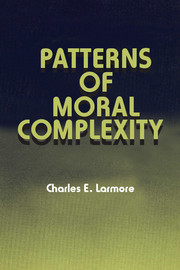Book contents
- Frontmatter
- Contents
- Preface
- Acknowledgments
- Chapter 1 MORAL JUDGMENT – AN ARISTOTELIAN INSIGHT
- Chapter 2 THE LIMITS OF NEO-ARISTOTELIANISM
- Chapter 3 LIBERALISM AND THE NEUTRALITY OF THE STATE
- Chapter 4 THE POLITICAL ORDER AND PERSONAL IDEALS
- Chapter 5 POLITICAL ROMANTICISM
- Chapter 6 THE HETEROGENEITY OF MORALITY
- CONCLUSION
- Notes
- Bibliography
- Index
Chapter 6 - THE HETEROGENEITY OF MORALITY
Published online by Cambridge University Press: 05 June 2012
- Frontmatter
- Contents
- Preface
- Acknowledgments
- Chapter 1 MORAL JUDGMENT – AN ARISTOTELIAN INSIGHT
- Chapter 2 THE LIMITS OF NEO-ARISTOTELIANISM
- Chapter 3 LIBERALISM AND THE NEUTRALITY OF THE STATE
- Chapter 4 THE POLITICAL ORDER AND PERSONAL IDEALS
- Chapter 5 POLITICAL ROMANTICISM
- Chapter 6 THE HETEROGENEITY OF MORALITY
- CONCLUSION
- Notes
- Bibliography
- Index
Summary
In this chapter I shall examine a dimension of moral complexity that bears on the relation between morality and religion. But I shall not be concerned with the problem with which that relation is usually associated – the objectivity of moral beliefs. If God does not exist, I believe it does not follow that everything is permitted. The idea that only the existence of God can support the objectivity of morals relies upon the dubious epistemology of foundationalism, transposed to the realm of morality. It supposes that our moral beliefs can lay claim to objectivity only if we can show how they can be justified as a whole, that this justification en masse is possible only if they are seen to promote some purpose that is ours whether or not we recognize it to be so, and that such a telos can be ours only if there is a God who has created us to that end. The underlying assumption of this outlook is that the contextual justification of moral beliefs cannot secure their objectivity. I have argued earlier in this book that such an assumption is baseless and that we have no good reason to deny objectivity to morals in just the sense that we affirm it of science.
- Type
- Chapter
- Information
- Patterns of Moral Complexity , pp. 131 - 150Publisher: Cambridge University PressPrint publication year: 1987
- 1
- Cited by



